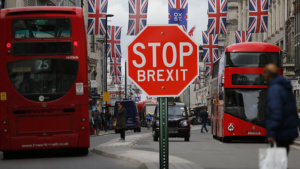A group of anti-Brexit Scottish members of parliament has been given the go-ahead to pursue legal action to establish whether the United Kingdom can unilaterally stop the process of leaving the EU, a Scottish court said on Friday.

The Scottish Court of Session has accepted a petition from the cross-party group of seven MPs, excluding British Prime Minister Theresa May’s ruling Conservatives, to determine whether Brexit can be stopped if Britain, acting alone, decides to reverse the process.
The British government has three weeks to respond to the challenge, before the Edinburgh court – Scotland’s supreme civil judicial body – sets a date to hear the case, a spokesman said.
The seven MPs from the Labour Party, Scottish National Party, the Liberal Democrats and the Scottish Greens, want the Court of Sessions to refer the matter to the European Court of Justice, the EU’s highest court, to conclusively rule on the issue.
“We know it is possible to stay in the European Union if the other member states allow. But experts believe our parliament can withdraw the (leaving) notification without their permission,” the Scottish MPs said in a statement earlier this week.
“But there is only one way to be sure: a court has to decide what Article 50 means.”
May formally notified the EU of Britain’s intention to leave the EU by triggering Article 50 of the Lisbon Treaty on March 29, starting a two-year exit process, and has said she will not tolerate any attempt in parliament to block it.
Brexit supporters argue that after last year’s referendum vote to leave, any attempt to halt the process would be anti-democratic. But opponents say the country should have a right to pass final judgement on any exit deal negotiated, and the Scottish challenge is the latest legal attempt to try to ensure this happens.
Article 50 does not specify whether the exit process can be unilaterally reversed although former British diplomat Lord Kerr who drafted it has said Britain can change its mind at any stage before the final exit date in 2019.
The referendum saw 52 percent of voters backing Brexit. The poll shook Britain’s structure, as voters in Northern Ireland and Scotland backed remaining in the EU but those in Wales and England opted to leave.
However, a recent BMG opinion poll found that 51 percent of Britons would now keep EU membership versus 41 percent who still wanted to leave.
Kindly follow us on twitter:@AfricanVoice2








